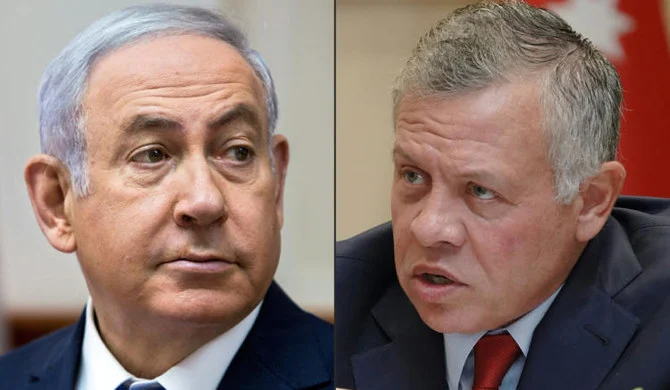
- ARAB NEWS
- 04 Jul 2025

King Abdullah of Jordan’s meeting with Israeli Prime Minister Benjamin Netanyahu in Amman on Tuesday was the first between the two men in almost five years. It is no secret that Abdullah does not trust the Israeli premier and the two have sparred many times, mostly over Israel’s provocations at the Al-Aqsa Mosque compound. The meeting signals a possible thaw and a concession by Netanyahu following the king’s bold threat that he would not tolerate Israel crossing his red lines over Al-Haram Al-Sharif.
A few days before Netanyahu’s government took office, Abdullah told CNN that he was prepared for “conflict” should the status of Jerusalem’s holy sites change, adding that he was concerned that Israel was trying to push for changes to his custodianship of the Muslim and Christian holy sites. He warned that, “if people want to push those red lines, then we will deal with that.”
Apparently, Tuesday’s meeting took place as a result of direct US pressure on Netanyahu to recommit to previous understandings.
It did not take long for the new far-right Israeli government to provoke its neighbor, Jordan, with which Israel has an almost 30-year-old peace treaty, over one of the most sensitive issues for the Hashemite kingdom: The status of Al-Aqsa. A day after Netanyahu’s most extreme government in history was sworn in at the end of December, his highly controversial National Security Minister Itamar Ben-Gvir made a provocative tour of the courts of Al-Aqsa in occupied East Jerusalem, sending a message to his radical followers that he is a man of his word. He has called for changing the centuries-old status quo agreement at the holy site to allow Jews to worship openly and to divide the Muslim shrine.
And, last week, Israel sought to set a precedent by blocking the Jordanian ambassador to Tel Aviv from making a routine visit to the compound, which is under the kingdom’s waqf administration.
Following a formal protest, he was later allowed in. But the challenge to Jordan’s sovereignty over the 144,000 sq. meter Al-Haram Al-Sharif was unambiguous. Jordan told the UN Security Council session on the breach that Israel was seeking to ignite a religious conflict. The following day, 35 EU consuls and representatives visited the site to show solidarity with Jordan and to underline their recognition of the Hashemite custodianship.
For years now, the almost daily storming of Al-Aqsa by radical Jewish settlers has been allowed under successive Israeli governments. None, so far, have come close to altering or abrogating the historic status quo of the Muslim shrine. But even a “friendly” Naftali Bennett, the former prime minister of Israel, who ruled over a coalition government until November 2022, boldly declared last May that “all decisions regarding the Temple Mount (Al-Aqsa Mosque) and Jerusalem will be made by the Israeli government, which holds sovereignty over the city, without any foreign considerations.”
While Jordan suspending the peace treaty would trigger a serious crisis with Israel and the US, it cannot be excluded entirely.
Osama Al-Sharif
Most Jordanian pundits believe that Israel going that extra mile — meaning upsetting the 19th-century status quo tenet on Al-Haram Al-Sharif — is only a matter of time. It could happen under this government or the next. The fact that Israel is being taken over by ultranationalist and ultra-Orthodox parties, as demonstrated by the results of last November’s elections, underlines the point.
In 2015, then-US Secretary of State John Kerry formalized a deal between Abdullah and Netanyahu that reinforced the existing status quo agreement. In recent days and weeks, the US, Europe, Russia, China, the Arab League and many others have expressed support for Jordan’s role and for maintaining the existing status quo at the holy site. In fact, the US delivered a stern message to Netanyahu that it would not accept any change to Jordan’s role at Al-Aqsa.
But even if Netanyahu, who is not to be trusted, adheres to the current status quo, can he rein in his radical coalition partners: Ben-Gvir and Bezalel Smotrich, who is finance minister and leader of the Religious Zionist Party? For personal purposes and to preserve his coalition government, Netanyahu has already made considerable concessions to both concerning the future of East Jerusalem and the West Bank. More provocations are almost certainly on their way. So how would Jordan react?Jordan’s custodianship is linked directly to the legitimacy of the Hashemites, who have been guardians of the Noble Sanctuary since the 1920s. Like his father, the late King Hussein, Abdullah has underlined his unbreakable personal bond as custodian of the holy site, in addition to Christian shrines in East Jerusalem.
While suspending the peace treaty would trigger a serious crisis with Israel and the US, it cannot be excluded entirely. That would be Jordan’s nuclear option. Most likely, Jordan would initially count on a major international backlash, led by the US and Europe, if Israel did tamper with the existing status quo. It would also seek the support of the Arab states that have joined the Abraham Accords, hoping that they would use their leverage with the Israeli premier.
Jordan is moving to preempt any Israeli rupture by waging a diplomatic campaign to assert its role at Al-Haram Al-Sharif. But Israel would be wrong to believe that Jordan would not risk suspending the peace treaty if it did go ahead with altering the status quo at the compound.
But despite all these dangers, Israel’s religious and ultranationalist far right believes that taking over Al-Aqsa is a must in the battle for the Judaization of Jerusalem and its attempts to end all traces of Muslim and Christian legacy there. Averting such a catastrophic event must not be down to Jordan alone.
• Osama Al-Sharif is a journalist and political commentator based in Amman. Twitter: @plato010